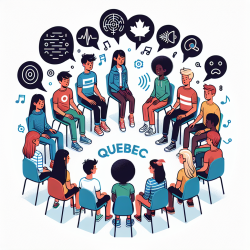The Diverse World of Speech and Language Therapy
Speech and language therapy is a profession that offers a rich tapestry of opportunities and rewards. For those interested in helping individuals with communication and swallowing difficulties, this field provides a dynamic career path that integrates elements of science, education, and healthcare.
What Do Speech and Language Therapists Do?
Speech and language therapists (SLTs) are trained professionals who assist individuals of all ages with communication challenges. Their work is crucial for children and adults facing difficulties such as:
- Speech and sound production issues
- Language disorders
- Swallowing difficulties
- Communication problems due to conditions like autism or stroke
SLTs collaborate closely with parents, caregivers, and other professionals, such as teachers and healthcare providers, to create comprehensive support systems for their clients.
Where Do SLTs Work?
With approximately 15,000 SLTs in the UK, the scope of work environments is vast. They can be found in:
- Schools and universities
- Hospitals and community health centers
- Research institutions
- Private practices and charities
- Prisons and courtrooms
This variety allows SLTs to specialize in different areas and continuously develop their expertise.
Why Choose a Career in Speech and Language Therapy?
Becoming an SLT offers numerous benefits, including the chance to:
- Engage with a diverse range of people
- Work in a rapidly evolving field that blends multiple disciplines
- Be part of a team and take on leadership roles
- Continuously learn and solve problems creatively
For those who enjoy a challenging yet fulfilling career, speech and language therapy can be incredibly rewarding.
Real Stories from SLTs
Rebecca, a pediatric SLT, found her passion during a placement at a special school. Her work involves developing alternative communication methods for children with complex needs. She values the collaborative environment that allows her to learn from other professionals.
Natalie, who leads a hospital-based team, combines her love for languages with medicine. She appreciates the mix of clinical, managerial, and research opportunities her role provides.
Amit transitioned from clinical practice to research, focusing on evidence-based methods to enhance therapy outcomes. His work supports SLTs across the UK in delivering high-quality care.
Lauren shifted from sports science to speech therapy, driven by the impact of communication skills on academic success. Her role includes clinical work, research, and leadership development.
Katie, a newly qualified therapist, applies her knowledge of neuroscience to assist individuals with acquired language disorders, using technology to overcome communication barriers.
How to Become a Speech and Language Therapist
To pursue a career as an SLT, one must complete a recognized degree program and register with the Health and Care Professions Council (HCPC). Entry into undergraduate courses typically requires A-levels or equivalent qualifications, with some programs offering postgraduate routes for those with relevant degrees.
Clinical placements are integral to these courses, providing hands-on experience in various settings. For those interested in an alternative pathway, opportunities exist as assistant practitioners or bilingual co-workers, often with on-the-job training and further qualifications available.
For more information, please follow this link.










